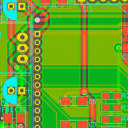
@gabornagy93 depending on your application, you could use a stock (or customized) OpenWrt build for the Omega2S, which uses the open source mt76 wifi driver built on the nl80211/cfg80211 architecture.
mt76 was unreliable at the time Omega2 came out. It greatly improved over the years, and recently a company with a product based on MT7688 invested some money for getting their mt76 based product through wifi certification, making mt76 super stable and perfomant. It can also work in station (wifi client) mode without being an access point at the same time.
Of course, with stock Openwrt you would not have any of Onion's additions by default. But as the Onion openwrt package feed is open source you could add it into your openwrt build environment, and build/use those packages you'd need. Of course, things depending on the Omega proprietary driver would not work unmodified.
You could also start with the onion openwrt tree and try to replace the proprietary driver by a recent mt76 in there, but I guess that could get much more complicated than the other way around.
For my own (dozens) Omgea2 based projects with thousands of devices in the field I always used stock OpenWrt with some customisation on top. To keep my changes apart from the openwrt tree, so I don't have to fork it, I wrote a untility script that might help others, too.